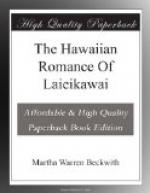[Footnote 6: Moerenhout translates (I, 419): “He was, Taaroa (Kanaloa) was his name. He dwelt in immensity. Earth was not. Taaroa, called, but nothing responded to him, and, existing alone, he changed himself into the universe. The pivots (axes or orbits), this is Taaroa; the rocks, this is he. Taaroa is the sand, so is he named. Taaroa is the day. Taaroa is the center. Taaroa is the germ. Taaroa is the base. Taaroa is the invincible, who created the universe, the sacred universe, the shell for Taaroa, the life, life of the universe.”]
[Footnote 7: Moerenhout, I, 423: “Taaroa slept with the woman called Hina of the sea. Black clouds, white clouds, rain are born. Taaroa slept with the woman of the uplands; the first-germ is born. Afterwards is born all that grows upon the earth. Afterwards is born the mist of the mountain. Afterwards is born the one called strong. Afterwards Is born the woman, the beautiful adorned one,” etc.]
[Footnote 8: Grey, pp. 38-45; Kraemer, Samoa Inseln, pp. 395-400; Fison, pp. 139-146; Mariner, I, 228; White, II, 75; Gill, Myths and Songs, p. 48.]
[Footnote 9: In Fornander’s collection of origin chants the Hawaiian group is described as the offspring of the ancestors Wakea and Papa, or Hina.]
3. THE DEMIGOD AS HERO
As natural forms multiplied, so multiplied the gods who wedded and gave them birth. Thus the half-gods were born, the kupua or demigods as distinguished from akua or spirits who are pure divinities.[1] The nature of the Polynesian kupua is well described in the romance of Laieikawai, in Chapter XXIX, when the sisters of Aiwohikupua try to relieve their mistress’s fright about marrying a divine one from the heavens. “He is no god—Aole ia he Akua—” they say, “he is a man like us, yet in his nature and appearance godlike. And he was the first-born of us; he was greatly beloved by our parents; to him was given superhuman power—ka mana—which we have not.... Only his taboo rank remains, Therefore fear not; when he comes you will see that he is only a man like us.” It is such a character, born of godlike ancestors and inheriting through the favor of this god, or some member of his family group, godlike power or mana, generally in some particular form, who appears as the typical hero of early Hawaiian romance. His rank as a god is gained by competitive tests with a rival kupua/ or with the ancestor from whom he demands recognition and endowment. He has the power of transformation into the shape of some specific animal, object, or physical phenomenon which serves as the “sign” or “body” in which the god presents himself to man, and hence he controls all objects of this class. Not only the heavenly bodies, clouds, storms, and the appearances in the heavens, but perfumes and notes of birds serve to announce his divinity, and special kinds of birds, or fish, or reptiles, or of animals like the rat, pig, or dog, are recognized as peculiarly likely to be the habitation of a god. This is the form in which aumakua, or guardian spirits of a family, appear to watch over the safety of the household they protect.[2]




